Key takeaways:
- Reviewer feedback, while initially daunting, is an opportunity for improvement and deeper exploration of research concepts.
- Constructive criticism fosters collaboration, resilience, and adaptability, enhancing the quality of academic work.
- Creating an action plan to address feedback helps organize thoughts and prioritize revisions, making the process more manageable.
- Effective communication with reviewers, expressing appreciation and clarity, strengthens relationships and enhances the revision experience.
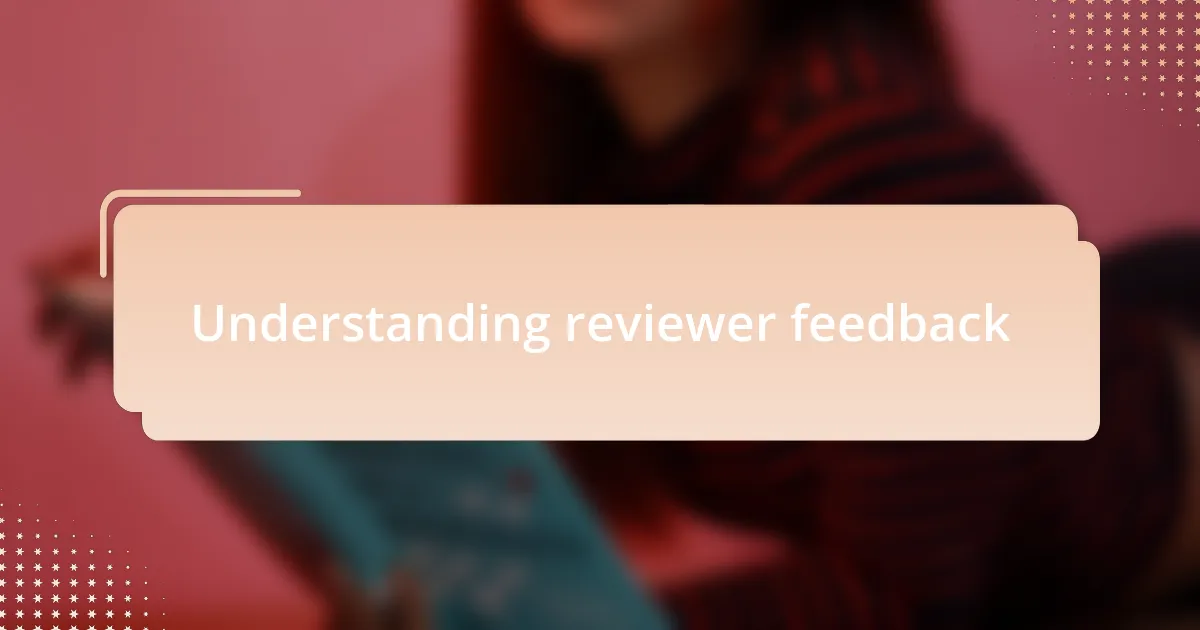
Understanding reviewer feedback
Understanding reviewer feedback can often feel overwhelming, especially when the suggestions seem critical or extensive. I remember receiving a review that felt like an avalanche of revisions, and I could have easily been discouraged. Have you ever found yourself staring at a screen, grappling with your emotions after reading a reviewer’s comments? It’s a common experience; I’ve been there.
The essence of reviewer feedback often lies in their desire to help improve your work, even if it doesn’t always feel that way at first. For instance, I once received comments that pointed out gaps in my methodology, which initially stung. But once I took a step back, I realized these insights could enhance the validity of my research. How many times can we turn criticism into a constructive opportunity?
Moreover, understanding the reviewer’s perspective is crucial. They’re often engaged in similar lines of research and offer a valuable lens on how your work fits into the broader academic dialogue. I’ve learned that diving deeper into their comments can unearth insights I hadn’t considered, transforming initial frustration into excitement for further exploration. What if approaching their feedback as a collaborative dialogue changes the way you view critiques?
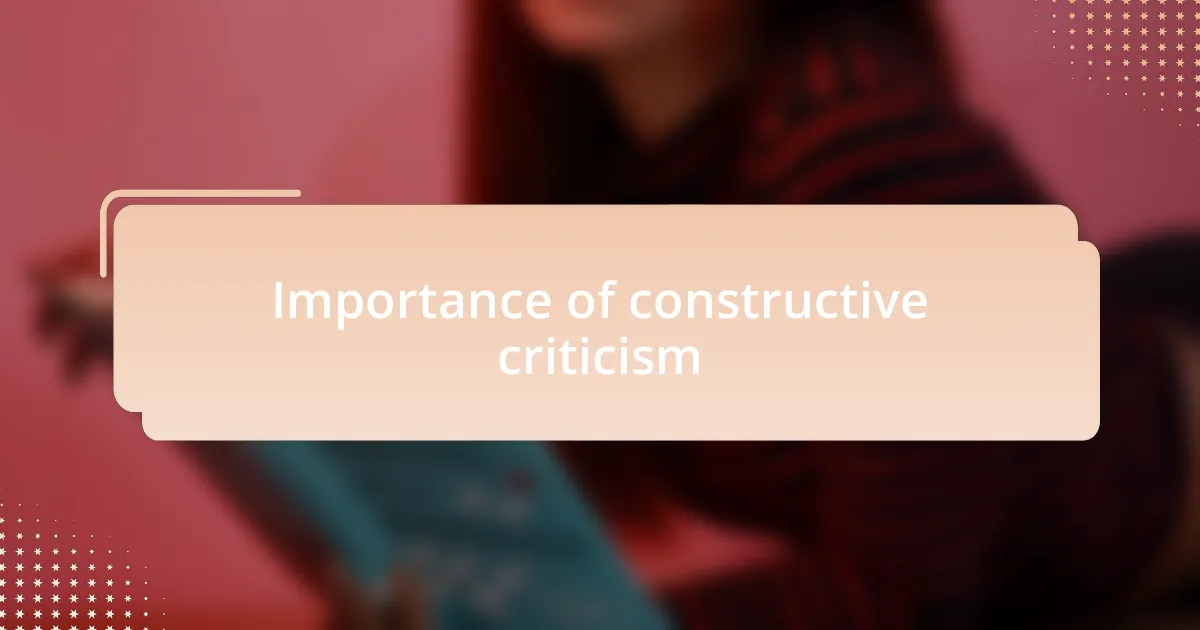
Importance of constructive criticism
Constructive criticism serves as a valuable tool for growth in academic writing. I once received a review suggesting a complete overhaul of my chapter’s structure. At first, it felt disheartening, but I quickly realized this feedback opened doors to a more coherent narrative that I hadn’t previously imagined. Have you ever found that a single suggestion led to an entirely new direction in your work?
Moreover, embracing constructive criticism fosters resilience and adaptability. When I reviewed a colleague’s paper, I noticed areas where they could strengthen their arguments but hesitated to voice my thoughts. Later, I learned that my feedback could have been a springboard for them to enhance their already brilliant ideas. Can we afford to shy away from offering or receiving insights that ultimately fortify our academic endeavors?
In essence, constructive criticism promotes a culture of collaboration within the academic community. I cherish moments when I’ve seen scholars unite to refine each other’s work, transforming potentially painful reviews into collective progress. If we could view critiques as stepping stones rather than stumbling blocks, wouldn’t our collective scholarly output shine even brighter?
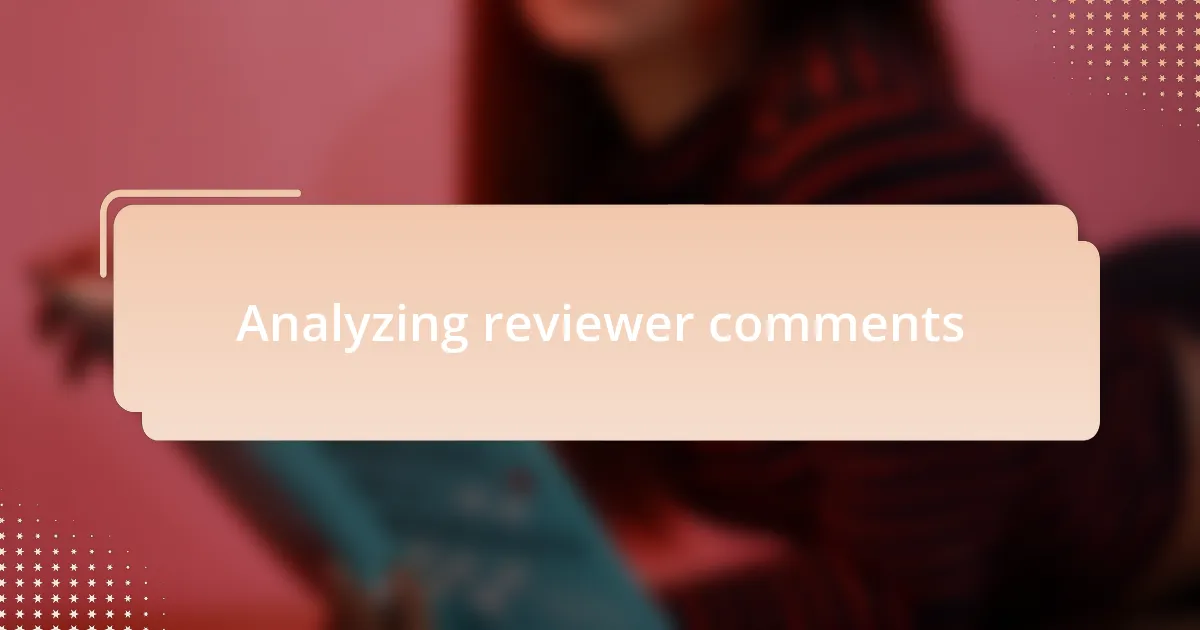
Analyzing reviewer comments
When I first received reviewer comments, I often focused solely on the negative aspects. It felt overwhelming, as if I were being critiqued rather than aided. However, with time, I learned to view each comment as a treasure map leading to improvements. For example, one reviewer pointed out a lack of clarity in my arguments. Initially, I was defensive, but upon closer examination, those observations helped me clarify my main ideas considerably, enhancing the overall coherence of my paper.
In analyzing comments, I’ve found it helpful to categorize them into themes: structural issues, content gaps, and stylistic suggestions. This approach not only organizes my thoughts but also helps me prioritize which feedback to tackle first. I recall one instance where a reviewer highlighted the need for additional literature. Instead of dreading the extra work, I viewed it as an opportunity to delve deeper into my research area. This shift in perspective allowed me to enhance my understanding of the topic and, consequently, strengthen my manuscript.
One of the most enlightening lessons I’ve learned is to engage with the comments, not just read them. I started discussing feedback with peers, which brought fresh insights I hadn’t considered. I remember a brainstorming session after receiving suggestions that seemed contradictory. Through dialogue, we uncovered a unifying idea that made my paper more innovative. How often do we miss out on clarity by not exploring these comments in depth? Analyzing feedback collaboratively can transform uncertainties into enlightening discussions that significantly elevate our work.
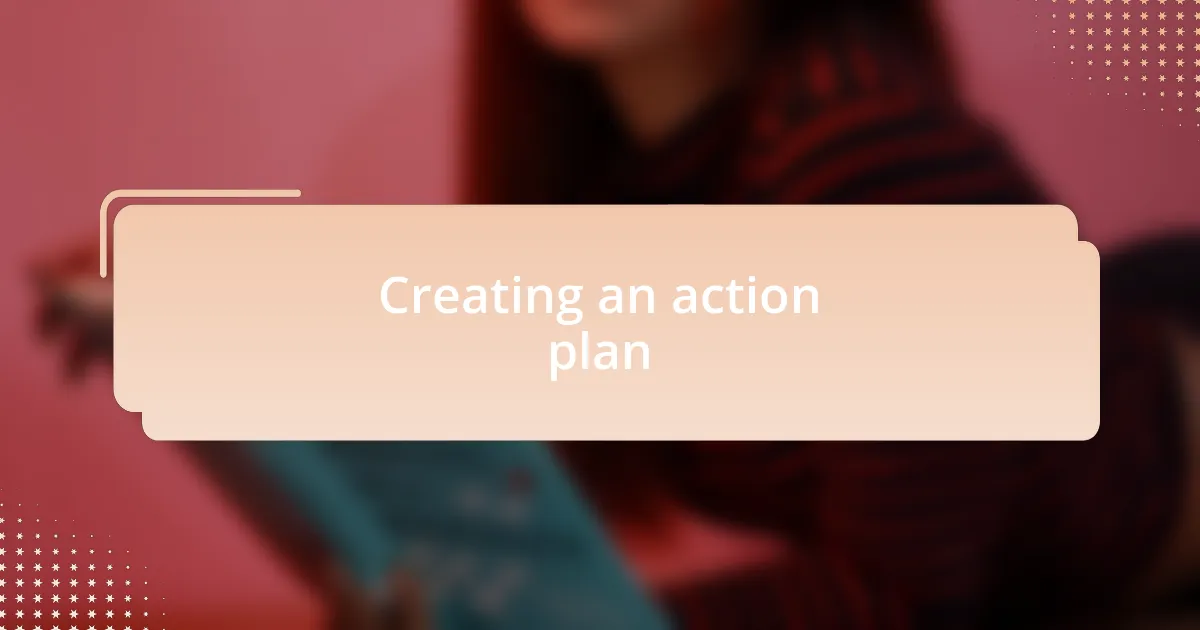
Creating an action plan
Creating an action plan following the analysis of reviewer feedback is crucial for effective revisions. I typically create a simple table that outlines each comment, my response, and the specific actions I’ll take. I found that breaking down the feedback this way clarifies my path forward. For example, when one reviewer stressed the need for improved methodology, I noted it down. My immediate thought was, “How can I address this without losing my original focus?” This direct approach leads me to actionable steps instead of feeling overwhelmed.
Once I have these actions outlined, I prioritize them based on their impact on the paper’s overall quality. I remember when a reviewer suggested expanding on a particular theory I was applying. Initially, I bristled at the request; it felt daunting to add more complex layers. However, once I categorized it as a top priority, I was able to dedicate a focused session to exploring that theory. It transformed my section on theoretical frameworks from a barebones explanation to a rich discussion that truly engaged my readers.
As I dive into implementation, I check off each task as it’s completed, which provides a satisfying sense of progress. Sometimes, I even reward myself with small breaks or treats after tackling tougher comments. This method not only boosts my motivation but also keeps my work dynamic. Have you ever experienced that momentum when ticking off goals? Those small victories create a snowball effect, making the revision process feel less like a chore and more like a journey towards excellence.
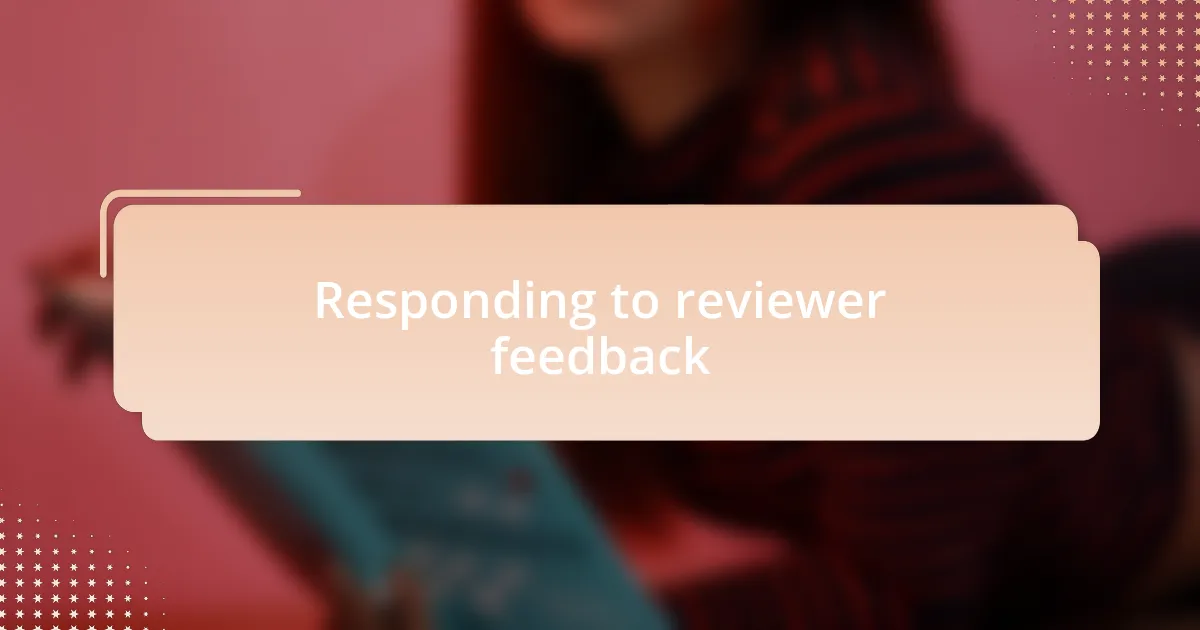
Responding to reviewer feedback
When it comes to responding to reviewer feedback, clarity is paramount. I remember a specific instance where one reviewer found my argument unconvincing, which stung at first. It prompted me to ask myself, “What did I not explain clearly?” After coming to terms with their perspective, I took the feedback as a constructive opportunity. I rewrote that section, ensuring to include clear examples and additional evidence, which ultimately strengthened my manuscript.
One key strategy I employ is addressing feedback point by point. Recently, a reviewer commented on the need for more diverse sources to support my claims. It felt daunting at first, but I tackled it systematically. I started by creating a list of potential sources, which turned into a mini research project that deepened my understanding of the topic. Isn’t it fascinating how feedback can lead us down new paths of discovery?
In addition to detail-oriented responses, I’ve learned the importance of emotional intelligence in my replies. When I crafted my response letter, I took care to express appreciation for the reviewer’s insights while also articulating my rationale behind certain choices. I’ve found that acknowledging the effort taken to review my work fosters a more collegial atmosphere. After all, engaging respectfully can be as transformative as the revisions themselves.

Sharing your revisions
When it comes to sharing revisions, I’ve discovered that transparency can make a world of difference. I recall a time when I provided a detailed summary of my changes alongside my manuscript. That clarity not only showcased my responsiveness but also invited constructive dialogue with the reviewers. Was it worth the additional effort? Absolutely! The reviewers appreciated the insight into my thought process, which fostered a more collaborative relationship.
I always ensure to highlight the most significant alterations in my response letter. Once, I reformulated a major argument based on the reviewers’ suggestions, and I made it a point to emphasize that change prominently. By doing so, I not only addressed their concerns but also illustrated my commitment to improving the manuscript. It felt rewarding to acknowledge that their feedback had a direct impact on the final outcome.
While sharing revisions, I’m mindful to express gratitude for the reviewers’ insights. This moment of appreciation can transform your communication from a transactional exchange into a more human interaction. Reflecting on my experiences, I often wonder: how can we nurture a spirit of collaboration in academia? By valuing the reviewers’ perspectives and sharing my revisions with respect, I believe we can elevate the discourse in our field.
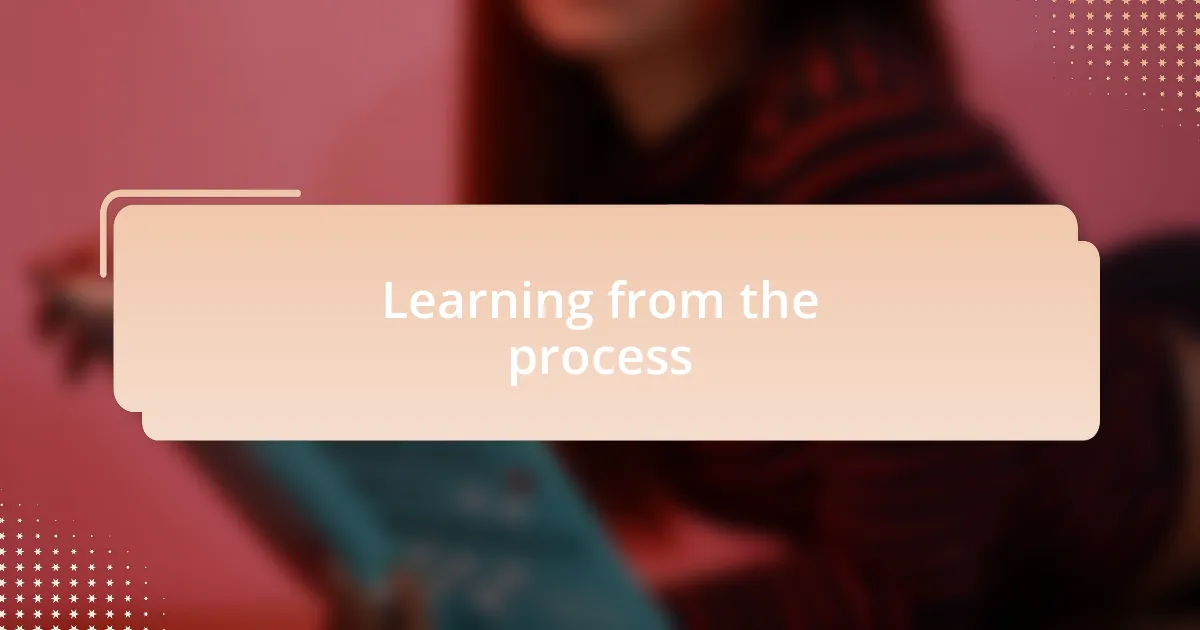
Learning from the process
Learning to navigate reviewer feedback has been a transformative experience for me. One particular instance comes to mind: after receiving harsh criticism on a methodology section, I took a step back and tried to comprehend the reviewers’ perspectives. Instead of feeling defeated, I found myself energized to delve deeper into the research. It was enlightening to realize how constructive criticism could reshape my understanding and ultimately strengthen my work.
I’ve always maintained that every piece of feedback is an opportunity for growth. During one of my revisions, I discovered a reviewer’s suggestion about adding a new dimension to my analysis. Initially hesitant, I decided to embrace the change. This not only enhanced my manuscript but also deepened my appreciation for diverse viewpoints. Have you ever experienced an “aha” moment that changed your perspective entirely? For me, this was it.
As I reflect on the entire process, I recognize that accepting and learning from feedback truly cultivates a resilient mindset. Each revision cycle taught me patience and perseverance. I remember the sleepless nights fueled by coffee and passion, knowing that every bit of effort would pay off in the end. It raises the question: how do we transform our approaches to criticism in academic publishing? Embracing feedback as a learning opportunity has fundamentally reshaped my journey, making each manuscript not just a project, but a stepping stone for future success.